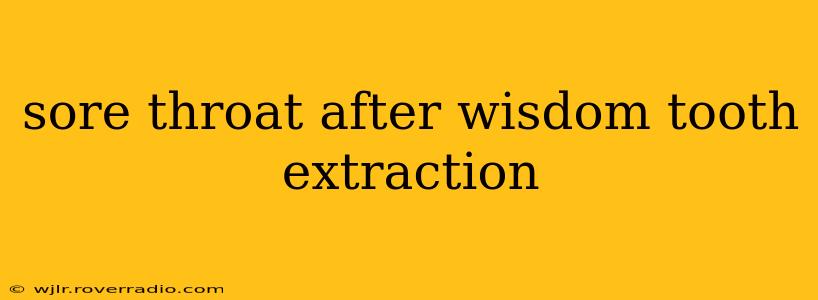Having your wisdom teeth removed is a common procedure, but recovery can be uncomfortable. A sore throat after wisdom tooth extraction is a frequent complaint, and understanding its causes and how to manage it is crucial for a smoother recovery. This comprehensive guide will address the common concerns surrounding post-wisdom tooth extraction sore throats, providing you with the information you need to navigate this phase of your recovery.
What Causes a Sore Throat After Wisdom Tooth Extraction?
A sore throat following wisdom tooth extraction isn't usually a sign of infection, but rather a result of the surgical procedure itself. Several factors contribute:
-
Irritation from the surgery: The surgical instruments used during the extraction can irritate the tissues in your mouth and throat, leading to soreness. The process of removing the tooth and cleaning the extraction site can cause minor trauma.
-
Swelling: Swelling is a natural part of the healing process. As the area swells, it can put pressure on surrounding tissues, including those in your throat, causing discomfort.
-
Dry socket: While less common, a dry socket (alveolar osteitis) occurs when the blood clot protecting the extraction site dislodges. This can expose the bone and nerve endings, leading to significant pain, often radiating to the throat. This is far more painful than general post-surgical soreness.
-
Mouth breathing: After extraction, you might breathe through your mouth more often, especially if you have swelling. This can dry out your throat and exacerbate the soreness.
-
Medication side effects: Some pain medications, such as opioids, can cause dry mouth and throat as a side effect, further contributing to discomfort.
Why Does My Throat Hurt So Much After Wisdom Tooth Extraction?
The intensity of throat pain varies from person to person. Several factors can influence the severity:
-
Complexity of the extraction: Impacted wisdom teeth requiring more extensive surgical procedures are more likely to result in greater post-operative discomfort, including throat pain.
-
Individual pain tolerance: Everyone experiences pain differently. What might be mild discomfort for one person could be severe for another.
-
Infection (rare): In rare cases, a severe sore throat could be a sign of infection. This usually presents with other symptoms like fever, increased swelling, and pus. Seek immediate medical attention if you suspect an infection.
How Long Does a Sore Throat Last After Wisdom Tooth Extraction?
Generally, a sore throat related to wisdom tooth extraction should subside within a few days. Most people experience the most significant discomfort during the first 24-48 hours, with gradual improvement thereafter. If the pain persists for more than a week or worsens, consult your dentist or oral surgeon.
What Can I Do to Relieve a Sore Throat After Wisdom Tooth Extraction?
Several home remedies can help alleviate a sore throat:
-
Saltwater gargles: Gently gargling with warm salt water several times a day can help reduce inflammation and soothe the throat.
-
Warm compresses: Applying a warm compress to the outside of your jaw can help reduce swelling and ease discomfort.
-
Over-the-counter pain relievers: Ibuprofen or acetaminophen can help manage pain. Always follow the recommended dosage instructions.
-
Staying hydrated: Drinking plenty of fluids helps prevent dry mouth and throat. Avoid extremely hot or cold beverages.
-
Rest: Adequate rest allows your body to focus on healing.
Is a Sore Throat After Wisdom Teeth Removal Normal?
Yes, some degree of throat soreness is considered normal after wisdom tooth extraction. However, severe, persistent pain or pain accompanied by other symptoms, such as fever or pus, requires immediate medical attention.
When Should I Call My Dentist or Oral Surgeon?
Contact your dentist or oral surgeon immediately if you experience:
- Severe or worsening pain
- High fever
- Increased swelling
- Pus or discharge from the extraction site
- Difficulty breathing or swallowing
- Signs of infection
This information is for general knowledge and does not constitute medical advice. Always consult with your dentist or oral surgeon for any concerns regarding your oral health. They can provide personalized recommendations based on your specific situation.
